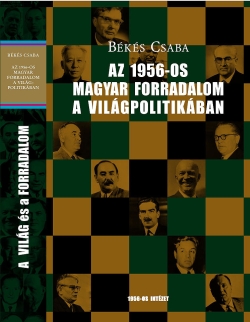
The 1956 Hungarian Revolution in World Politics
By Csaba Békés
Budapest, 1956-os Intézet, 2006
391 pages, 5990 Ft
An English language edition of this book is forthcoming:
Csaba Békés: Cold War, Détente, Revolution. Center for Hungarian Studies and Publications, Inc. (Social Science Monographs), Boulder, Colorado, Wayne, New Jersey.
Click here for an English-language summary.

|
Table
of Contents
|
||
| Foreword | ||
| Introduction | ||
| I. | The main trends in East-West relations, 1945-53 | |
|
The origins of the Cold War |
||
|
The German question |
||
|
The Marshall Plan |
||
|
Sovietization of East-Central Europe |
||
|
The years of the classic Cold War |
||
| II. | East-Central Europe and the great powers, 1953-56 | |
|
The Soviet Union |
||
| Soviet–East-Central
European relations in transformation Soviet crisis management and de-Stalinization in East-Central Europe |
||
| The Western Great Powers | ||
| III. | The Hungarian Revolution and World politics | |
|
Hopes and illusions in Hungary |
||
|
The foreign policy of the Imre Nagy government |
||
|
The making of the declaration of neutrality |
||
|
The Soviet Union and the Soviet Bloc |
||
|
The Western world, the Suez crisis and the United Nations |
||
| The
United States of America Britain, France and the Suez crisis The Hungarian question in the United Nations |
||
| IV. | The international impact of the revolution | |
|
Developments in East-West relations |
||
|
The United Nations and the Third World |
||
|
The United States of America |
||
|
The Soviet Union |
||
|
The Soviet Bloc |
||
|
Western public opinion |
||
|
APPENDIX |
||
| List of documents | ||
| References | ||
| Bibliography (compiled by László Gyõri and András Kiss) | ||
| Index of names | ||
| Abbreviations | ||
| English summary | ||
| English table of contents | ||